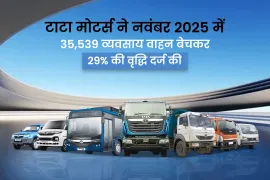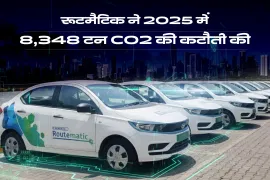India में वाणिज्यिक वाहन और टायरों समाचार- सभी नवीनतम ट्रक, बस, 3 पहियेवाले, ट्रैक्टर और टायरों की जानकारी
नवीनतम ट्रक समाचार
 टाटा मोटर्स ने नवंबर 2025 में 35,539 व्यवसाय वाहन बेचकर 29% की वृद्धि दर्ज कीटाटा मोटर्स ने नवंबर 2025 में कुल 35,539 व्यवसाय वाहन बेचे, जो नवंबर 2024 के 27,636 वाहनों की तुलना में 29% अधिक हैं। यह वृद्धि देश में मजबूत मांग, निर्यात में बढ़ोतरी और कंपनी की विविध व्यवसाय वाहन श्रृंखला को दर्शाती है। घरेलू बिक्री 32,753 वाहन रह...3 min readJS
टाटा मोटर्स ने नवंबर 2025 में 35,539 व्यवसाय वाहन बेचकर 29% की वृद्धि दर्ज कीटाटा मोटर्स ने नवंबर 2025 में कुल 35,539 व्यवसाय वाहन बेचे, जो नवंबर 2024 के 27,636 वाहनों की तुलना में 29% अधिक हैं। यह वृद्धि देश में मजबूत मांग, निर्यात में बढ़ोतरी और कंपनी की विविध व्यवसाय वाहन श्रृंखला को दर्शाती है। घरेलू बिक्री 32,753 वाहन रह...3 min readJSBy Jyoti
Wed Dec 03 2025
 दिल्ली की ज़हरीली हवा: कैसे ट्रक चालक अपनी जान जोखिम में डालकर सड़क पर काम कर रहे हैंसाल 2025 में दिल्ली फिर एक बार घने धुएँ और धुंध की चादर में ढकी हुई है। हवा ज़हरीली हो चुकी है और लोग खुले में साँस लेने से डरते हैं। लेकिन इसी जहरीली हवा के बीच ट्रक चालक रोज़ाना सड़क पर उतरते हैं। उनका काम रुक नहीं सकता, क्योंकि दिल्ली की रोज़मर्रा...4 min readJS
दिल्ली की ज़हरीली हवा: कैसे ट्रक चालक अपनी जान जोखिम में डालकर सड़क पर काम कर रहे हैंसाल 2025 में दिल्ली फिर एक बार घने धुएँ और धुंध की चादर में ढकी हुई है। हवा ज़हरीली हो चुकी है और लोग खुले में साँस लेने से डरते हैं। लेकिन इसी जहरीली हवा के बीच ट्रक चालक रोज़ाना सड़क पर उतरते हैं। उनका काम रुक नहीं सकता, क्योंकि दिल्ली की रोज़मर्रा...4 min readJSBy Jyoti
Wed Dec 03 2025
 फ़ोर्स मोटर्स ने 2,000 करोड़ रुपये का व्यवसाय निवेश योजना की घोषणा कीफ़ोर्स मोटर्स ने अगले तीन सालों में 2,000 करोड़ रुपये का व्यवसाय निवेश करने की योजना बनाई है। इसका उद्देश्य कंपनी की वैश्विक पहुँच बढ़ाना और निर्माण तथा उत्पाद क्षमता को मजबूत करना है।कंपनी, जो लगातार दो तिमाहियों से ऋण मुक्त है, इस धनराशि का इस्तेमा...3 min readIG
फ़ोर्स मोटर्स ने 2,000 करोड़ रुपये का व्यवसाय निवेश योजना की घोषणा कीफ़ोर्स मोटर्स ने अगले तीन सालों में 2,000 करोड़ रुपये का व्यवसाय निवेश करने की योजना बनाई है। इसका उद्देश्य कंपनी की वैश्विक पहुँच बढ़ाना और निर्माण तथा उत्पाद क्षमता को मजबूत करना है।कंपनी, जो लगातार दो तिमाहियों से ऋण मुक्त है, इस धनराशि का इस्तेमा...3 min readIGBy Indraroop
Wed Nov 26 2025
 औरोरा के स्वयं चलने वाले ट्रकों ने टेक्सास में पूरे किए 1,200 मीलटेक्सास में औरोरा इनोवेशन ने अपने स्वयं चलने वाले ट्रक कार्यक्रम को आगे बढ़ाया है। कम्पनी ने बताया कि उसके स्वयं चलने वाले ट्रकों ने राज्य की मुख्य राजमार्गों पर 1,200 मील की यात्रा बिना चालक के पूरी की। इस दौरान ट्रकों ने वास्तविक सामान को चुने हुए...4 min readJS
औरोरा के स्वयं चलने वाले ट्रकों ने टेक्सास में पूरे किए 1,200 मीलटेक्सास में औरोरा इनोवेशन ने अपने स्वयं चलने वाले ट्रक कार्यक्रम को आगे बढ़ाया है। कम्पनी ने बताया कि उसके स्वयं चलने वाले ट्रकों ने राज्य की मुख्य राजमार्गों पर 1,200 मील की यात्रा बिना चालक के पूरी की। इस दौरान ट्रकों ने वास्तविक सामान को चुने हुए...4 min readJSBy Jyoti
Thu Nov 20 2025
 छोटे ट्रक, बड़े पहाड़, बर्फीली सड़कें: लद्दाख की सर्दियों में व्यवसायलद्दाख में सर्दी जल्दी शुरू होती है और अप्रैल तक रहती है। इस समय यह क्षेत्र भारत के सबसे अलग-थलग इलाकों में से एक बन जाता है। भारी बर्फबारी और खतरनाक सड़कें होने की वजह से बड़े पहाड़ी रास्ते बंद हो जाते हैं। हवाई परिवहन महंगा और सीमित है, इसलिए छोटे...4 min readIG
छोटे ट्रक, बड़े पहाड़, बर्फीली सड़कें: लद्दाख की सर्दियों में व्यवसायलद्दाख में सर्दी जल्दी शुरू होती है और अप्रैल तक रहती है। इस समय यह क्षेत्र भारत के सबसे अलग-थलग इलाकों में से एक बन जाता है। भारी बर्फबारी और खतरनाक सड़कें होने की वजह से बड़े पहाड़ी रास्ते बंद हो जाते हैं। हवाई परिवहन महंगा और सीमित है, इसलिए छोटे...4 min readIGBy Indraroop
Thu Nov 20 2025
 अशोक लेलैण्ड साथी: डिज़ाइन, इंजन और पेलोड का सरल परिचयअशोक लेलैण्ड साथी भारत के हल्के व्यवसाय वाहन वर्ग में आता है। यह वाहन छोटे कारोबारियों और रोज़ाना सामान ढोने वाले लोगों के लिए बनाया गया है। नीचे इसके डिज़ाइन, इंजन, माइलेज, पेलोड और सीमाओं को सरल भाषा में समझाया गया है।डिज़ाइनअशोक लेलैण्ड साथी ट्रक...4 min readJS
अशोक लेलैण्ड साथी: डिज़ाइन, इंजन और पेलोड का सरल परिचयअशोक लेलैण्ड साथी भारत के हल्के व्यवसाय वाहन वर्ग में आता है। यह वाहन छोटे कारोबारियों और रोज़ाना सामान ढोने वाले लोगों के लिए बनाया गया है। नीचे इसके डिज़ाइन, इंजन, माइलेज, पेलोड और सीमाओं को सरल भाषा में समझाया गया है।डिज़ाइनअशोक लेलैण्ड साथी ट्रक...4 min readJSBy Jyoti
Thu Nov 20 2025
नवीनतम बस समाचार
 ज़िंगबस ने नए ऑपरेटर साझेदारी मॉडल से इलेक्ट्रिक बसों का बेड़ा बढ़ायाइंटरसिटी स्मार्ट मोबिलिटी तकनीक प्लेटफ़ॉर्म ज़िंगबस ने अपनी इलेक्ट्रिक वाहन पहल को बढ़ाया है। अब यह बस ऑपरेटरों के साथ साझेदारी करके बेड़ा चलाता है, बजाय इसके कि पूरी तरह से खुद की बसें चलाए। पहले ज़िंगबस कंपनी-के-स्वामित्व, कंपनी-के-ऑपरेटेड मॉडल पर...2 min readIG
ज़िंगबस ने नए ऑपरेटर साझेदारी मॉडल से इलेक्ट्रिक बसों का बेड़ा बढ़ायाइंटरसिटी स्मार्ट मोबिलिटी तकनीक प्लेटफ़ॉर्म ज़िंगबस ने अपनी इलेक्ट्रिक वाहन पहल को बढ़ाया है। अब यह बस ऑपरेटरों के साथ साझेदारी करके बेड़ा चलाता है, बजाय इसके कि पूरी तरह से खुद की बसें चलाए। पहले ज़िंगबस कंपनी-के-स्वामित्व, कंपनी-के-ऑपरेटेड मॉडल पर...2 min readIGBy Indraroop
Tue Dec 02 2025
 क्या अब स्लीपर बसों को बंद कर देना चाहिए?लंबी दूरी की यात्रा के लिए स्लीपर बसें पहले आरामदायक, सस्ती और तेज़ मानी जाती थीं। लेकिन हाल की दो बड़ी दुर्घटनाओं और लगातार सामने आ रही कई कमियों ने एक बड़ा सवाल खड़ा कर दिया है: क्या स्लीपर बसों को अलविदा कहने का समय आ गया है? यह सवाल सिर्फ आराम का...6 min readJS
क्या अब स्लीपर बसों को बंद कर देना चाहिए?लंबी दूरी की यात्रा के लिए स्लीपर बसें पहले आरामदायक, सस्ती और तेज़ मानी जाती थीं। लेकिन हाल की दो बड़ी दुर्घटनाओं और लगातार सामने आ रही कई कमियों ने एक बड़ा सवाल खड़ा कर दिया है: क्या स्लीपर बसों को अलविदा कहने का समय आ गया है? यह सवाल सिर्फ आराम का...6 min readJSBy Jyoti
Wed Nov 19 2025
 अशोक लेलैंड इलेक्ट्रिक वाहन बाजार में आगे, स्विच मोबिलिटी ने कमाया मुनाफाअशोक लेलैंड का इलेक्ट्रिक-वाहन व्यवसाय, स्विच मोबिलिटी, ने वित्तीय वर्ष 2026 की पहली छमाही में अपना पहला शुद्ध मुनाफा दर्ज किया। यह माता कंपनी के ईवी (इलेक्ट्रिक वाहन) परिवर्तन में एक महत्वपूर्ण कदम है।स्विच मोबिलिटी की सफलता का श्रेय कड़े खर्च नियंत...2 min readIG
अशोक लेलैंड इलेक्ट्रिक वाहन बाजार में आगे, स्विच मोबिलिटी ने कमाया मुनाफाअशोक लेलैंड का इलेक्ट्रिक-वाहन व्यवसाय, स्विच मोबिलिटी, ने वित्तीय वर्ष 2026 की पहली छमाही में अपना पहला शुद्ध मुनाफा दर्ज किया। यह माता कंपनी के ईवी (इलेक्ट्रिक वाहन) परिवर्तन में एक महत्वपूर्ण कदम है।स्विच मोबिलिटी की सफलता का श्रेय कड़े खर्च नियंत...2 min readIGBy Indraroop
Mon Nov 17 2025
 अशोक लेलैंड ने यूके से इलेक्ट्रिक बस उत्पादन आरएके में स्थानांतरित कियाअशोक लेलैंड ने अपनी इलेक्ट्रिक बसों का उत्पादन यूनाइटेड किंगडम से संयुक्त अरब अमीरात के रस अल खैमाह (आरएके) में स्थानांतरित कर दिया है। यह कदम कंपनी को व्यवसाय वाहन बाज़ार में अपनी स्थिति मजबूत करने में मदद करता है और उसे ऐसे क्षेत्र में ले जाता है ज...3 min readJS
अशोक लेलैंड ने यूके से इलेक्ट्रिक बस उत्पादन आरएके में स्थानांतरित कियाअशोक लेलैंड ने अपनी इलेक्ट्रिक बसों का उत्पादन यूनाइटेड किंगडम से संयुक्त अरब अमीरात के रस अल खैमाह (आरएके) में स्थानांतरित कर दिया है। यह कदम कंपनी को व्यवसाय वाहन बाज़ार में अपनी स्थिति मजबूत करने में मदद करता है और उसे ऐसे क्षेत्र में ले जाता है ज...3 min readJSBy Jyoti
Fri Nov 14 2025
 डेनमार्क ने चीनी व्यवसाय बसों में संभावित “किल स्विच” पर चिंता जताईडेनमार्क की प्रशासनिक टीम ने गंभीर चिंता जताई है कि चीनी बनायी गई इलेक्ट्रिक व्यवसाय बसों में रिमोट तरीके से बंद करने की क्षमता हो सकती है। यह चिंता यूटोंग नामक चीनी कंपनी की बसों की जाँच के बाद सामने आई है, जो डेनमार्क के सार्वजनिक परिवहन नेटवर्क का...4 min readIG
डेनमार्क ने चीनी व्यवसाय बसों में संभावित “किल स्विच” पर चिंता जताईडेनमार्क की प्रशासनिक टीम ने गंभीर चिंता जताई है कि चीनी बनायी गई इलेक्ट्रिक व्यवसाय बसों में रिमोट तरीके से बंद करने की क्षमता हो सकती है। यह चिंता यूटोंग नामक चीनी कंपनी की बसों की जाँच के बाद सामने आई है, जो डेनमार्क के सार्वजनिक परिवहन नेटवर्क का...4 min readIGBy Indraroop
Tue Nov 11 2025
 आगामी ई-बस टेंडर के लिए अदानी, कनाडाई पेंशन फंड, टाटा मोटर्स, स्विच और ओलेक्ट्रा की प्रतिस्पर्धाभारत का इलेक्ट्रिक मोबिलिटी मिशन अब नई गति पकड़ रहा है।कन्वर्जेंस एनर्जी सर्विसेज़ लिमिटेड ने पीएम ई-ड्राइव योजना के तहत 10,900 इलेक्ट्रिक बसों की आपूर्ति और संचालन के लिए बोलियाँ आमंत्रित की हैं। इससे साफ-सुथरी सार्वजनिक परिवहन प्रणाली को बढ़ा...3 min readIG
आगामी ई-बस टेंडर के लिए अदानी, कनाडाई पेंशन फंड, टाटा मोटर्स, स्विच और ओलेक्ट्रा की प्रतिस्पर्धाभारत का इलेक्ट्रिक मोबिलिटी मिशन अब नई गति पकड़ रहा है।कन्वर्जेंस एनर्जी सर्विसेज़ लिमिटेड ने पीएम ई-ड्राइव योजना के तहत 10,900 इलेक्ट्रिक बसों की आपूर्ति और संचालन के लिए बोलियाँ आमंत्रित की हैं। इससे साफ-सुथरी सार्वजनिक परिवहन प्रणाली को बढ़ा...3 min readIGBy Indraroop
Mon Nov 10 2025
वेब स्टोरीज़
Signs You Need to Replace Your Truck Tyres
Truck Tyre Warning Signs: Learn how to spot worn-out tyres,...
Tube vs Tubeless: Which Tyres Are Right for You?
Tube vs Tubeless Tyres: Discover the differences in performance, safety,...
Ashok Leyland Mitr vs Eicher Skyline – Bus Showdown
Ashok Leyland Mitr vs Eicher Skyline: Compare comfort, performance, and...
Force Urbania vs Tata Winger – Passenger Van Face-off
Force Urbania or Tata Winger? Compare seating, comfort, mileage &...
Ashok Leyland Dost vs Tata Ace – Who Wins in 2025?
Compare Ashok Leyland Dost and Tata Ace in 2025 to...
Tata Yodha vs Bolero Pickup: Best for Business?
Compare Tata Yodha and Mahindra Bolero Pik-Up to find the...
Mahindra E-Alfa Cargo: Range, Price, Performance
Explore Mahindra E-Alfa Cargo: compact electric three-wheeler with 95 km...
Top Electric Buses Operating in Indian Cities
Discover the leading electric buses running in Indian cities, offering...
WHAT MAKES THE JEETO STRONG CNG STAND OUT?
The Mahindra Jeeto Strong CNG is being tested in real-world...
SAPNO KE SHEHER MUMBAI NE KIYA SWAGAT!
Day 8 in Mumbai highlighted Jeeto Strong CNG’s smooth drive,...
नवीनतम इलेक्ट्रिक समाचार
 रूटमैटिक ने 2025 में एआई से कर्मचारी आवागमन सुधारकर 8,348 टन CO2 कम कियारूटमैटिक, एआई-आधारित कॉर्पोरेट आवागमन प्लेटफ़ॉर्म, ने राष्ट्रीय प्रदूषण नियंत्रण दिवस पर घोषणा की कि उसने 2025 में 8,348 टन कार्बन डाइऑक्साइड उत्सर्जन कम किया। यह कमी एआई से बेहतर रूटिंग, साझा परिवहन कार्यक्रम और सभी संचालन में इलेक्ट्रिक वाहन अपनाने...3 min readIG
रूटमैटिक ने 2025 में एआई से कर्मचारी आवागमन सुधारकर 8,348 टन CO2 कम कियारूटमैटिक, एआई-आधारित कॉर्पोरेट आवागमन प्लेटफ़ॉर्म, ने राष्ट्रीय प्रदूषण नियंत्रण दिवस पर घोषणा की कि उसने 2025 में 8,348 टन कार्बन डाइऑक्साइड उत्सर्जन कम किया। यह कमी एआई से बेहतर रूटिंग, साझा परिवहन कार्यक्रम और सभी संचालन में इलेक्ट्रिक वाहन अपनाने...3 min readIGBy Indraroop
Wed Dec 03 2025
 ओएसएम ने स्वयमगति कार्गो स्वचालित बिजली चालित मालवाहक पेश कियाओमेगा सेइकी मोबिलिटी (OSM) ने स्वयमगति कार्गो नाम का नया स्वचालित विद्युत मालवाहक तीन-पहिया वाहन पेश किया है। इसकी कीमत ₹4.15 लाख रखी गई है। यह मॉडल कंपनी के स्वचालित यात्री संस्करण के बाद औद्योगिक उपयोग के लिये प्रस्तुत किया गया दूसरा स्वचालित वाहन...3 min readJS
ओएसएम ने स्वयमगति कार्गो स्वचालित बिजली चालित मालवाहक पेश कियाओमेगा सेइकी मोबिलिटी (OSM) ने स्वयमगति कार्गो नाम का नया स्वचालित विद्युत मालवाहक तीन-पहिया वाहन पेश किया है। इसकी कीमत ₹4.15 लाख रखी गई है। यह मॉडल कंपनी के स्वचालित यात्री संस्करण के बाद औद्योगिक उपयोग के लिये प्रस्तुत किया गया दूसरा स्वचालित वाहन...3 min readJSBy Jyoti
Wed Dec 03 2025
 भारत में ई-रिक्शा बाज़ार की सुस्ती: एल5 बदलाव ने कैसे बदला पूरा खेलपिछले कई वर्षों तक भारत में ई-रिक्शा ने शहरों और कस्बों की आख़िरी दूरी की यात्रा को सबसे आसान और सस्ती सुविधा दी। कम कीमत, आसान देखभाल और तेज़ी से बढ़ता प्रसार, इन कारणों से यह वाहन लगभग हर भीड़भाड़ वाले इलाके में दिखाई देने लगा। लेकिन अब यह तेज़ी कम...4 min readJS
भारत में ई-रिक्शा बाज़ार की सुस्ती: एल5 बदलाव ने कैसे बदला पूरा खेलपिछले कई वर्षों तक भारत में ई-रिक्शा ने शहरों और कस्बों की आख़िरी दूरी की यात्रा को सबसे आसान और सस्ती सुविधा दी। कम कीमत, आसान देखभाल और तेज़ी से बढ़ता प्रसार, इन कारणों से यह वाहन लगभग हर भीड़भाड़ वाले इलाके में दिखाई देने लगा। लेकिन अब यह तेज़ी कम...4 min readJSBy Jyoti
Wed Dec 03 2025
 बजाज रिकी P40 05 बनाम प्रतियोगी: विस्तृत कीमत और फीचर तुलनाबजाज रिकी P40 05, जिसे कंपनी की उत्पाद पृष्ठ पर रिकी P4005 भी कहा गया है, घनी शहरी और आसपास के इलाकों में यात्री ढुलाई के लिये बनाया गया मॉडल है। इसका ढांचा रोज़ाना के व्यवसाय उपयोग को ध्यान में रखकर तैयार किया गया है। इसकी मध्यम रेंज, मजबूत चेसिस और...4 min readJS
बजाज रिकी P40 05 बनाम प्रतियोगी: विस्तृत कीमत और फीचर तुलनाबजाज रिकी P40 05, जिसे कंपनी की उत्पाद पृष्ठ पर रिकी P4005 भी कहा गया है, घनी शहरी और आसपास के इलाकों में यात्री ढुलाई के लिये बनाया गया मॉडल है। इसका ढांचा रोज़ाना के व्यवसाय उपयोग को ध्यान में रखकर तैयार किया गया है। इसकी मध्यम रेंज, मजबूत चेसिस और...4 min readJSBy Jyoti
Mon Dec 01 2025
 योधा का लक्ष्य L5 व्यवसाय ईवी से 30% आफ्टरमार्केट राजस्वयोधा, लोहिया ग्लोबल ग्रुप की इलेक्ट्रिक मोबिलिटी शाखा, भारत में L5 व्यवसाय ईवी (व्यवसाय ईवी) क्षेत्र में वृद्धि के लिए अपने आफ्टर-सेल्स इन्फ्रास्ट्रक्चर और डीलर नेटवर्क को बढ़ाने की योजना बना रही है।कंपनी का लक्ष्य अगले दो साल में अपने आफ्टरमार्केट र...3 min readIG
योधा का लक्ष्य L5 व्यवसाय ईवी से 30% आफ्टरमार्केट राजस्वयोधा, लोहिया ग्लोबल ग्रुप की इलेक्ट्रिक मोबिलिटी शाखा, भारत में L5 व्यवसाय ईवी (व्यवसाय ईवी) क्षेत्र में वृद्धि के लिए अपने आफ्टर-सेल्स इन्फ्रास्ट्रक्चर और डीलर नेटवर्क को बढ़ाने की योजना बना रही है।कंपनी का लक्ष्य अगले दो साल में अपने आफ्टरमार्केट र...3 min readIGBy Indraroop
Mon Dec 01 2025
 विनफास्ट अगस्त 2026 तक भारत के इलेक्ट्रिक बस बाज़ार में प्रवेश की तैयारी मेंवियतनाम की तेजी से बढ़ती इलेक्ट्रिक वाहन कम्पनी विनफास्ट अब भारत के इलेक्ट्रिक बस क्षेत्र में अगस्त 2026 तक प्रवेश करने की योजना बना रही है। कम्पनी पहले से ही कई देशों में इलेक्ट्रिक कार बेचती है और एक बड़ा इलेक्ट्रिक वाहन ढाँचा तैयार कर चुकी है। अब...4 min readJS
विनफास्ट अगस्त 2026 तक भारत के इलेक्ट्रिक बस बाज़ार में प्रवेश की तैयारी मेंवियतनाम की तेजी से बढ़ती इलेक्ट्रिक वाहन कम्पनी विनफास्ट अब भारत के इलेक्ट्रिक बस क्षेत्र में अगस्त 2026 तक प्रवेश करने की योजना बना रही है। कम्पनी पहले से ही कई देशों में इलेक्ट्रिक कार बेचती है और एक बड़ा इलेक्ट्रिक वाहन ढाँचा तैयार कर चुकी है। अब...4 min readJSBy Jyoti
Mon Dec 01 2025
शॉर्ट्स से जानिए रिव्यू

Mahindra Blazo X55 – Power, Mileage aur Performance ka Bindaas Combo! 🚛🔥

Montra Eviator E350L Full Review | Features, Range, Price & Ride Experience

Montra Eviator E350L Full Review | Features, Range, Price & Ride Experience

CNG + Petrol Bi-Fuel: Double Mileage, Double Savings! Full Review | 91Trucks

Mahindra Blazo X55 – Power, Mileage aur Performance ka Bindaas Combo! 🚛🔥

Tata Prima LX 5532.S – Har journey ke liye aapka reliable aur comfortable saathi

Introducing the All-New Eicher Pro X Diesel – Perfect for Last-Mile Logistics

BharatBenz 4832 – Sirf ek truck nahi, balki ekdum Power + Comfort ka Perfect Combo

🔥BharatBenz 5532 | Heavy Truck for Big Business Needs #TruckReview #91trucks #bharatbenz

Dumdaar Truck, Zabardast Power | Eicher 3018 XP Plus in Action! 🔥 #eicher #91trucks #mileageking
नवीनतम Tyres समाचार
 सरकार ने टायर पर जीएसटी घटाया, एटीएमए ने फैसले का स्वागत कियाउद्योग ने कर में राहत का किया स्वागतसरकार ने टायर पर लगने वाला वस्तु एवं सेवा कर (जीएसटी) कम कर दिया है। ऑटोमोटिव टायर मैन्युफैक्चरर्स एसोसिएशन (एटीएमए) ने इस कदम की सराहना की। संगठन का कहना है कि कम कर से गाड़ियों के मालिकों पर खर्च कम होगा और सड़क...2 min readPV
सरकार ने टायर पर जीएसटी घटाया, एटीएमए ने फैसले का स्वागत कियाउद्योग ने कर में राहत का किया स्वागतसरकार ने टायर पर लगने वाला वस्तु एवं सेवा कर (जीएसटी) कम कर दिया है। ऑटोमोटिव टायर मैन्युफैक्चरर्स एसोसिएशन (एटीएमए) ने इस कदम की सराहना की। संगठन का कहना है कि कम कर से गाड़ियों के मालिकों पर खर्च कम होगा और सड़क...2 min readPVBy Pratham
Fri Sep 05 2025
 भारत की खनन और ऊबड़-खाबड़ रास्तों पर चलने वाले भारी ट्रकों के लिए सबसे अच्छे टायर विकल्पभारत के खनन क्षेत्रों और ऊबड़-खाबड़ रास्तों पर सही टायर चुनना सिर्फ ज़रूरी नहीं, बल्कि आवश्यक है। व्यवसाय ट्रक के लिए ऐसा टायर चाहिए जो कंकरीली सड़कों, गर्मी और लगातार घिसावट को सह सके। ऐसे इलाकों में भारी ट्रक को सिर्फ ताकत नहीं, बल्कि समझदारी से बन...4 min readIG
भारत की खनन और ऊबड़-खाबड़ रास्तों पर चलने वाले भारी ट्रकों के लिए सबसे अच्छे टायर विकल्पभारत के खनन क्षेत्रों और ऊबड़-खाबड़ रास्तों पर सही टायर चुनना सिर्फ ज़रूरी नहीं, बल्कि आवश्यक है। व्यवसाय ट्रक के लिए ऐसा टायर चाहिए जो कंकरीली सड़कों, गर्मी और लगातार घिसावट को सह सके। ऐसे इलाकों में भारी ट्रक को सिर्फ ताकत नहीं, बल्कि समझदारी से बन...4 min readIGBy Indraroop
Thu Jul 31 2025
 ब्रिजस्टोन इंडिया ने तिरुपति में नया सिलेक्ट स्टोर खोलकर अपना खुदरा नेटवर्क बढ़ायाब्रिजस्टोन इंडिया ने आंध्र प्रदेश के धार्मिक और तेजी से बढ़ते शहर तिरुपति में एक नया सिलेक्ट स्टोर शुरू किया है। यह कदम कंपनी की उस योजना का हिस्सा है जिसके तहत वह देशभर में अपने टायर सेवाओं की पहुँच बढ़ाना चाहती है।यह नया स्टोर केवल टायर बेचने की जग...2 min readBS
ब्रिजस्टोन इंडिया ने तिरुपति में नया सिलेक्ट स्टोर खोलकर अपना खुदरा नेटवर्क बढ़ायाब्रिजस्टोन इंडिया ने आंध्र प्रदेश के धार्मिक और तेजी से बढ़ते शहर तिरुपति में एक नया सिलेक्ट स्टोर शुरू किया है। यह कदम कंपनी की उस योजना का हिस्सा है जिसके तहत वह देशभर में अपने टायर सेवाओं की पहुँच बढ़ाना चाहती है।यह नया स्टोर केवल टायर बेचने की जग...2 min readBSBy Bharat
Wed Jun 11 2025
 अपोलो टायर्स को सस्टेनेबिलिटी के लिए मिला इकोवैडिस गोल्ड रेटिंगअपोलो टायर्स को इकोवैडिस से गोल्ड रेटिंग मिली है, जिससे यह कंपनी टिकाऊपन प्रदर्शन के मामले में दुनिया भर की शीर्ष 5% कंपनियों में शामिल हो गई है। यह रेटिंग, जिसकी घोषणा 2 जून 2025 को की गई थी, वित्त वर्ष 2025 में अपोलो के 95वें परसेंटाइल स्कोर की पुष...3 min readPV
अपोलो टायर्स को सस्टेनेबिलिटी के लिए मिला इकोवैडिस गोल्ड रेटिंगअपोलो टायर्स को इकोवैडिस से गोल्ड रेटिंग मिली है, जिससे यह कंपनी टिकाऊपन प्रदर्शन के मामले में दुनिया भर की शीर्ष 5% कंपनियों में शामिल हो गई है। यह रेटिंग, जिसकी घोषणा 2 जून 2025 को की गई थी, वित्त वर्ष 2025 में अपोलो के 95वें परसेंटाइल स्कोर की पुष...3 min readPVBy Pratham
Fri Jun 06 2025
 कॉन्टिनेंटल ने भारत में व्यावसायिक वाहन के टायर बनाना बंद कियापरिचयकॉन्टिनेंटल इंडिया ने व्यावसायिक वाहन के टायर बनाना बंद कर दिया है। कंपनी ने उत्तर प्रदेश के मोदीपुरम प्लांट (मेरठ) में ट्रक और बस रेडियल टायर का उत्पादन रोक दिया है। यह उनके व्यावसायिक टायर के व्यवसाय से पूरी तरह बाहर निकलने का संकेत है।यह फैसल...2 min readPV
कॉन्टिनेंटल ने भारत में व्यावसायिक वाहन के टायर बनाना बंद कियापरिचयकॉन्टिनेंटल इंडिया ने व्यावसायिक वाहन के टायर बनाना बंद कर दिया है। कंपनी ने उत्तर प्रदेश के मोदीपुरम प्लांट (मेरठ) में ट्रक और बस रेडियल टायर का उत्पादन रोक दिया है। यह उनके व्यावसायिक टायर के व्यवसाय से पूरी तरह बाहर निकलने का संकेत है।यह फैसल...2 min readPVBy Pratham
Tue Jun 03 2025
 ट्रकों के टायर रोटेशन: क्यों जरूरी है और कितनी बार करना चाहिए?ट्रकों के टायर लगातार घिसते रहते हैं। लंबी यात्राएं, भारी भार और असमान सड़कें टायरों के ट्रेड को धीरे-धीरे खत्म कर देती हैं। लेकिन एक आसान और प्रभावी तरीका है जिससे टायरों की उम्र बढ़ाई जा सकती है, प्रदर्शन में सुधार किया जा सकता है और पैसे भी बचाए ज...4 min readPS
ट्रकों के टायर रोटेशन: क्यों जरूरी है और कितनी बार करना चाहिए?ट्रकों के टायर लगातार घिसते रहते हैं। लंबी यात्राएं, भारी भार और असमान सड़कें टायरों के ट्रेड को धीरे-धीरे खत्म कर देती हैं। लेकिन एक आसान और प्रभावी तरीका है जिससे टायरों की उम्र बढ़ाई जा सकती है, प्रदर्शन में सुधार किया जा सकता है और पैसे भी बचाए ज...4 min readPSBy Pawan
Mon Mar 24 2025
